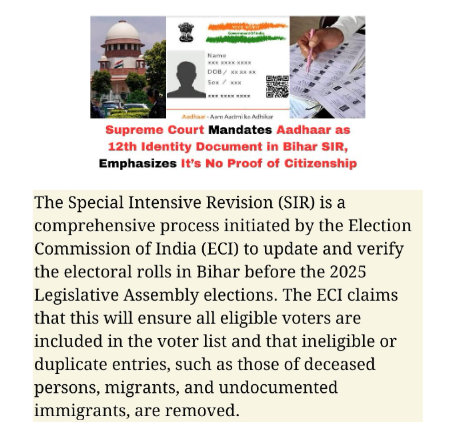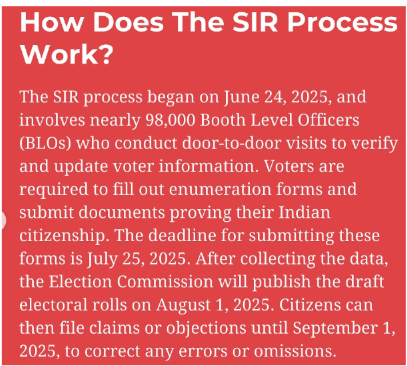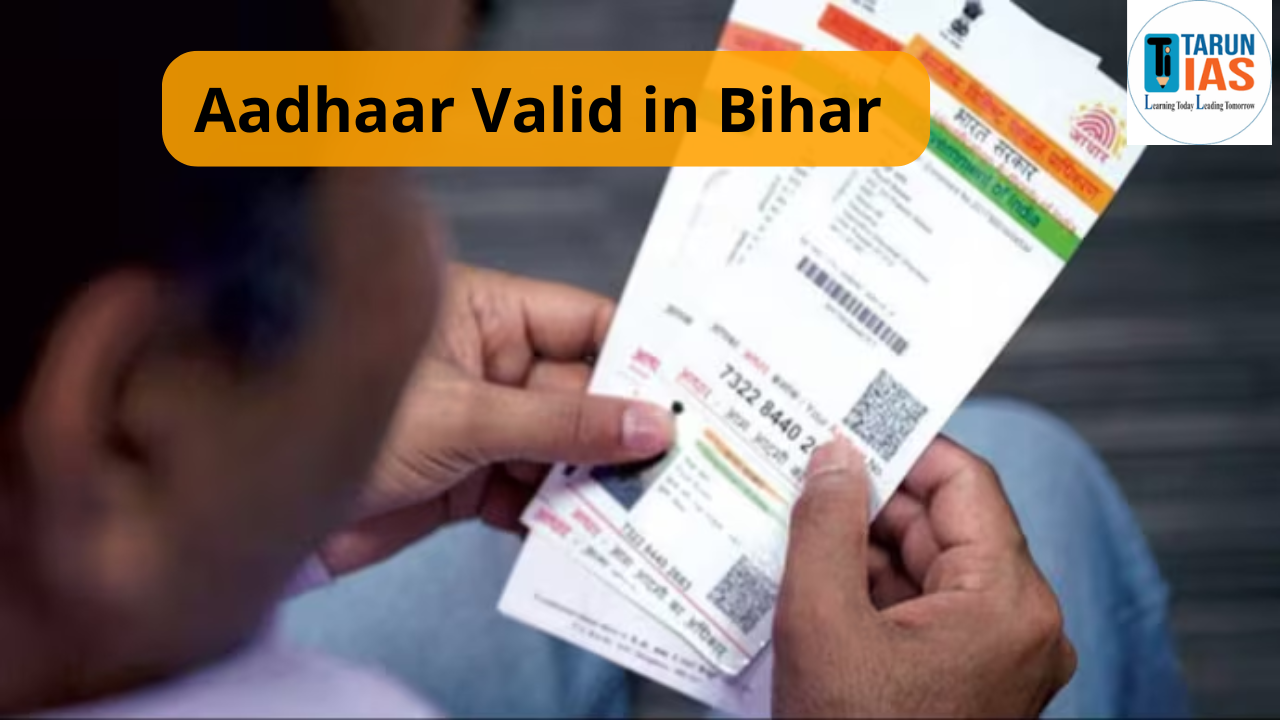Aadhaar Valid in Bihar’s Special Intensive Revision
- The Supreme Court recently instructed the Election Commission (EC) to accept Aadhaar as the 12th valid document for identity verification in the Special Intensive Revision (SIR) of electoral rolls in poll-bound Bihar. This decision strikes a balance between voter inclusion, electoral integrity, and citizenship verification, addressing longstanding concerns about document authenticity and illegal enrolments.

What has Supreme Court Instructed?
- Aadhaar as an Identity Document, Not Citizenship Proof: The Court directed the Election Commission (EC) to accept Aadhaar as the 12th valid identity document for Bihar’s voter list revision. However, it emphasized that Aadhaar cannot be used to establish citizenship. Key points:
-
-
- Aadhaar can confirm a voter’s identity and residence.
- The EC must verify the authenticity of Aadhaar numbers before including them in the electoral rolls.
- Individuals using forged or invalid Aadhaar cards can be excluded.
- Even genuine Aadhaar holders may face scrutiny regarding their citizenship, similar to those presenting caste certificates, matriculation certificates, or other official documents.
-
- Supreme Court on Citizenship Verification:
-
- The Court reiterated that citizenship is determined under the Citizenship Act, 1955, not by a single document like Aadhaar.
- Citizenship depends on birth and parental status, verified through official documents. Acceptable proofs include:
- Passports
- Birth certificates with parental details
- Citizenship or naturalisation certificates
- Certain government or school records, corroborated with additional evidence
- Booth-Level Officers (BLOs) are not empowered to decide citizenship. Their role is limited to verifying local identity and residence, while the central government remains the authority for citizenship determinations.
- Election Commission’s Role and Responsibilities: The Supreme Court has outlined specific duties for the EC in this context:
-
- Authenticate Aadhaar numbers before inclusion in electoral rolls.
- Exclude individuals if doubts regarding authenticity or citizenship persist.
- Ensure the process does not disenfranchise genuine citizens, balancing electoral integrity with inclusive voter registration.
- This guidance emphasizes accountability, transparency, and legality, ensuring that Bihar’s voter rolls remain both inclusive and accurate.

Some Key Insights in Aadhaar and Bihar’s Voter Registration Controversy
- Exclusion of Aadhaar as Valid Identity Document:
-
-
- During the Special Intensive Revision of electoral rolls in Bihar, the Election Commission excluded Aadhaar from the list of 11 accepted documents for voter registration.
- This omission raised concerns about document exclusion and the potential disenfranchisement of citizens.
- Eligible voters who relied on Aadhaar for identification faced barriers to registration, complicating their access to the electoral process.
-
- Shift from Inclusion to Exclusion:
-
-
- Traditionally, the ECI follows a principle of proactive inclusion, ensuring that all eligible citizens are registered.
- The SIR exercise reversed this approach, focusing on excluding individuals rather than ensuring everyone’s inclusion.
- The burden of proof shifted from the Commission to the voter, symbolizing a fundamental change in voter registration philosophy.
-
- Supreme Court Mandate on Aadhaar Inclusion:
-
- The controversy escalated to the Supreme Court of India, where Justices Surya Kant and Joymala Bagchi intervened:
- The Court directed the mandatory inclusion of Aadhaar in the list of accepted documents for voter registration.
- This judicial intervention emphasized that no eligible voter should be disenfranchised due to technicalities in document acceptance.
- Ignored Judicial Guidance:
-
-
- Interestingly, the Supreme Court had earlier suggested including Aadhaar in the accepted documents as early as July of the same year.
- Despite this guidance, the Election Commission initially overlooked the recommendation, prompting legal action.
- This highlighted concerns about institutional responsiveness and adherence to judicial directions in electoral governance.
-
- Historical Precedent and Verification Approach: Historically, voter verification in India relied on door-to-door checks over extended periods:
-
- The Commission bore primary responsibility for accuracy and inclusivity in the electoral rolls.
- This traditional approach emphasized citizen inclusion, minimizing the risk of disenfranchisement due to documentation issues.
- Fundamental Shift in Electoral Approach: The Aadhaar controversy symbolized a shift in the approach of India’s electoral machinery:
- From inclusive verification to an exclusionary system that placed the onus on voters.
- Raised debates about the role of independent institutions in safeguarding democratic rights.
- Sparked discussions on how technology and identity verification should balance efficiency with citizen accessibility.
Way Forward
- Systematic Impact on Nationwide Voter Rolls:
-
-
- Bihar’s case sets a precedent for ensuring that voting rights are protected nationwide.
- Lessons learned here are critical for future electoral roll revisions, ensuring no eligible citizen is excluded.
-
- Judicial Intervention as a Guiding Nudge:
-
-
- The court’s direction to include Aadhaar in the list of valid documents serves as a reminder that judicial oversight safeguards democratic principles.
- Judicial nudges can help the EC realign administrative processes with citizen-centric goals.
-
- Preserving Institutional Reputation:
-
- The Election Commission’s credibility, built over decades, depends on balancing:
- Accuracy in electoral rolls
- Maximum citizen inclusion
- Exclusionary practices, even unintentionally, can undermine public trust and damage the institution’s reputation.
- Prioritizing Fundamental Voting Rights:
-
- Future voter registration exercises must focus on core voting rights rather than administrative convenience or rushed timelines:
- Ensuring every eligible citizen is registered should be the top priority.
- Administrative efficiency must not come at the cost of disenfranchisement.
- Upholding Institutional Independence
-
- True independence of the Election Commission requires:
- Adhering to core democratic principles
- Avoiding exclusionary practices that erode public confidence
- Institutional independence is meaningful only when it protects citizens’ rights, not just procedures.
- Reinforcing Democratic Accountability:
-
- The episode underscores the need for the EC to demonstrate commitment to universal franchise:
- Implementing robust and inclusive processes strengthens democracy.
- The Commission’s actions should enhance, rather than weaken, citizen trust and electoral legitimacy















